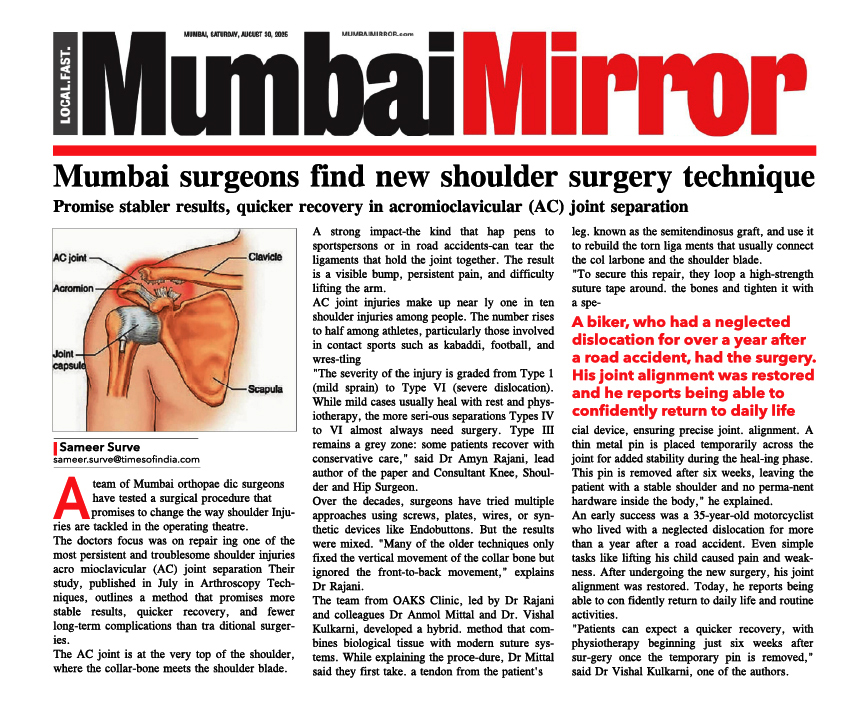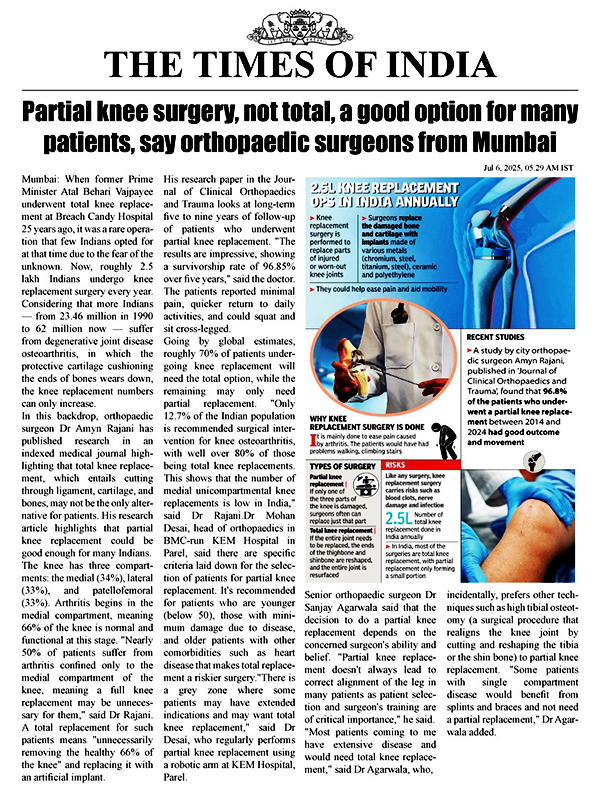Knee ligament injuries are among the most common and debilitating injuries, especially for athletes and physically active individuals. The knee, a complex joint, relies on various ligaments to maintain stability and function. These ligaments include the Anterior Cruciate Ligament (ACL), Posterior Cruciate Ligament (PCL), Posterolateral Corner (PLC), and Medial Patellofemoral Ligament (MPFL). Understanding these injuries, their diagnosis, and treatment options is essential for anyone experiencing knee problems. If you're seeking expert care, consider consulting a knee surgeon in Mumbai, an orthopaedic doctor in Mumbai, or a knee joint replacement specialist in Mumbai.
Knee Ligament Injuries
The knee joint is a pivotal hinge that supports a wide range of movements while bearing significant weight. Ligament injuries in the knee are often the result of sudden twists, high-impact collisions, or overextension. These injuries can range from mild sprains to complete tears, severely affecting the knee's stability and function.
Knee Ligament Repair
Knee ligament repair focuses on restoring the normal function and stability of the knee. Depending on the severity of the injury, this can involve surgical or nonsurgical methods. The choice of treatment is influenced by factors such as the patient's age, activity level, and the specific ligament involved.
How Knee Ligaments Get Damaged
Knee ligament injuries typically occur through high-impact sports, accidents, or activities that involve rapid changes in direction or sudden stops. Common mechanisms of injury include:
- Twisting or pivoting: Sudden changes in direction can overstress the ligaments.
- Direct impact: Blows to the knee, often seen in contact sports.
- Overextension: Extending the knee beyond its normal range of motion.
- Landing awkwardly: Improper landing from jumps, especially on a single leg.
Expert Diagnosis and Treatment
Accurate diagnosis is critical for effective treatment. Orthopaedic doctors in Mumbai utilize a combination of patient history, physical examinations, and imaging studies such as MRI or X-rays to diagnose ligament injuries.
- Physical Examination: Assessing swelling, range of motion, and pain points.
- Imaging Studies: MRI is particularly useful for visualizing soft tissue injuries, including ligament tears.
Types of Knee Ligaments and Injuries
The ACL is crucial for stabilizing the knee during rotational movements. Injuries to the ACL are common in sports that require sudden stops or changes in direction.
- Symptoms: A popping sound at the time of injury, severe pain, swelling, and instability.
- Treatment: ACL injuries often require surgical reconstruction using grafts from the patient or a donor.
The PCL prevents the tibia from moving backward. PCL injuries usually occur due to direct impact to the front of the knee, such as in car accidents.
- Symptoms: Mild swelling, pain, and difficulty walking.
- Treatment: Mild injuries may heal with physical therapy, while severe tears might require surgical repair.
The PLC consists of multiple structures that stabilize the knee. Injuries here are complex and often involve multiple ligaments.
- Symptoms: Instability, especially when the knee is bent, swelling, and pain.
- Treatment: Surgical intervention is often necessary, involving repair or reconstruction of multiple structures.
The MPFL helps stabilize the kneecap (patella). Injuries typically result from patellar dislocation.
- Symptoms: Pain around the kneecap, instability, and a sensation of the kneecap shifting out of place.
- Treatment: MPFL reconstruction is usually performed to restore patellar stability.
Surgical and Nonsurgical Treatment Options
Nonsurgical Treatments
- Physical Therapy: Strengthening the muscles around the knee to improve stability.
- Bracing: Using knee braces to protect and stabilize the knee.
- Medications: Anti-inflammatory drugs to manage pain and swelling.
- Rest and Ice: Reducing activity and applying ice to control swelling.
Surgical Treatments
- Arthroscopic Surgery: Minimally invasive surgery using a camera and instruments inserted through small incisions.
- Ligament Reconstruction: Replacing the torn ligament with a graft from the patient's own tissue or a donor.
- Ligament Repair: Directly suturing the torn ligament, although this is less common than reconstruction.
Rehab for Your Repaired Knee
Rehabilitation is a critical component of recovery from knee ligament injuries. A comprehensive rehab program involves:
-
Immediate Post-Surgery Care:
- Controlling pain and swelling through medication and ice.
- Early movement exercises to prevent stiffness.
-
Strengthening and Flexibility:
- Gradual introduction of weight-bearing activities.
- Strengthening exercises for the quadriceps, hamstrings, and calf muscles.
-
Advanced Training:
- Balance and proprioception exercises to restore knee stability.
- Sport-specific drills for athletes returning to their activities.
-
Monitoring Progress:
- Regular follow-ups with your knee surgeon in Mumbai or orthopaedic doctor in Mumbai.
- Adjusting the rehab program based on recovery milestones.
Conclusion
Knee ligament injuries can significantly impact your mobility and quality of life. Understanding the nature of these injuries, the mechanisms behind them, and the treatment options available is crucial for effective recovery. Whether you opt for surgical or nonsurgical treatment, a comprehensive rehabilitation program is essential for regaining knee function. For those in Mumbai, seeking the expertise of a knee surgeon, orthopaedic doctor, or knee joint replacement specialist can ensure you receive the best care and achieve optimal recovery.
Trust Your Knee Health to Dr. Amyn Rajani - Leading Knee Surgeon in Mumbai
When it comes to your knee health, trust the expertise of Dr. Amyn Rajani, a renowned knee surgeon in Mumbai. Specializing in ACL, PCL, PLC, and MPFL treatments, Dr. Rajani offers personalized care and cutting-edge surgical and nonsurgical solutions to help you regain mobility and live pain-free. Book your consultation today and take the first step towards a healthier, more active life.
For more information or to book a consultation with Dr. Amyn Rajani, visit OAKS Clinic at Hughes Road, Mumbai or website www.dramynrajani.com or simply call on Clinic Number 91-88989 75355 / 91-22-23619137 to take the first step towards a pain-free future.





